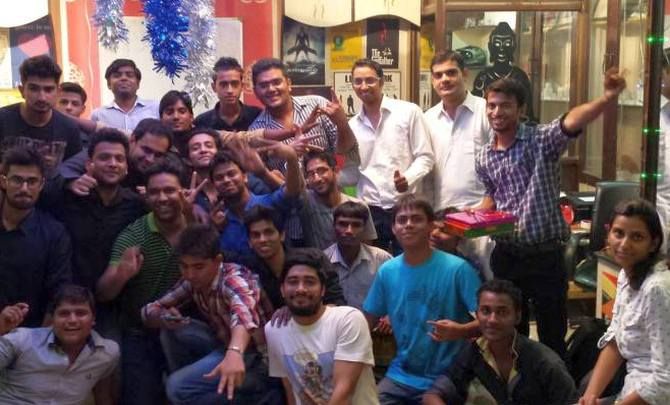 | « Back to article | Print this article |
We decided to destroy everything that we had built from scratch. Why did we take this extreme step? What exactly went wrong?
But whatever our failures. We are not going anywhere. We are just coming back with a new look.
Editor's note: Bluegape is a two-and-a-halfyear-old start-up which came out of a dorm room at IIT Kanpur, in August 2011. They started off by selling personalised posters and have since pivoted several times in search of the perfect business model. They were in news recently when several media houses reported that they were shutting down completely. Here's their take on the news.

We were completely innocent kids when we started Bluegape back in 2011. We still had a semester left at IIT Kanpur when TLabs gave us seed funding.
In last three years:
1. We built a team of 50+ people
2. Set up offices in two cities
3. One million happy customers
4. Profitable
5. 1Cr+ revenue every month
6. Raised multiple rounds of funding
And then we decided to destroy everything that we had built from scratch. Why did we take this extreme step? What exactly went wrong?
For those who are new to Bluegape: We were a platform for designers and brands. The designs would be printed on merchandise and the designer would get royalty.
As you can see, the risks were plenty. We were innocent kids when we started Bluegape back in 2011 and with very little idea of what it takes to build big business.
Here are three big lessons that I can take with me from this journey:
Focus on your key metrics
Every business has key metrics that they have to stay focussed on. For Facebook, that would be number of active users, average time they spend in a day on the platform and may be number of Facebook pages on the platform. For Flipkart, it would be the number of transactions everyday and number of sellers/SKUs.
In Bluegape, those "Key Metrics" for us were number of active desginers/brands on the platform and amount of royalty they are making every month.
I am not saying that these are the only metrics that one should track. Definitely there are hundred of other metrics like Site Speed, SEO etc, etc.
But if the key metrics are growing, then the business is growing. And the key metrics are those that align with the long-term vision of the company.
In our case, we got into a lot of short term opportunities because of which we lost the USP of our business and became a "Me Too" business. We increased our revenues in short-term but scalability became a challenge, because those opportunities didn't make sense in the long-term.
The next time I build a business, I will look at "key metrics" of my business every weekend to ask myself if I am doing something that is not aligned with the long term vision.
Be ethical all the time
One can only build a great business on strong ethical grounds. Like Sachin Tendulkar always said that he played his game with honesty and never looked for short cuts.
Reddit made initial users by themselves. That's okay. Because that was a part of solving chicken and egg problem. They didn't harm anyone.
We sometimes got unethical in business. We sold designs which we knew are under copyright. That had to backfire on us.
We also did one more thing which was completely unethical. I can't share it right now. That will stay between Bluegape and Sachin Bansal (CEO, Flipkart) till the day I will write a complete book on it.
Think big
Two quotes that come to my mind are one by Tony Hsieh, "whatever you are thinking think bigger" and other one is that "either you solve a big problem or a small problem -- it takes same amount of time."
We could have built Bluegape much bigger than a revenue of just a crores per month. We went on to sell the merchandise on marketplaces like Flipkart, Amazon and SnapDeal. They had big user base and we got easy transactions. But instead of becoming a niche e-commerce website, we became a seller on these marketplaces.
We were not owning the users who were buying our products on Flipkart, Amazon or SnapDeal.
Building a niche e-commerce website was a much bigger opportunity than becoming a seller on marketplaces. We got it all wrong.
When I communicated to the team that "we have come a long way forward but in wrong direction, opportunity is not so big and challenging from here". We had to change things drastically.
Out of them, 18 rockstars came back to me and said that they are ready to work on any pivot without salary but can't see shutting down the brand that we made with all the love, passion, hard work, tears, emotions.
I know 100+ people personally who look at Bluegape as a successful student start-up. We just can't shut it down.
We are not going anywhere. We are just coming back with a new look.
Sahil Baghla is the co-founder and CEO of Bluegape